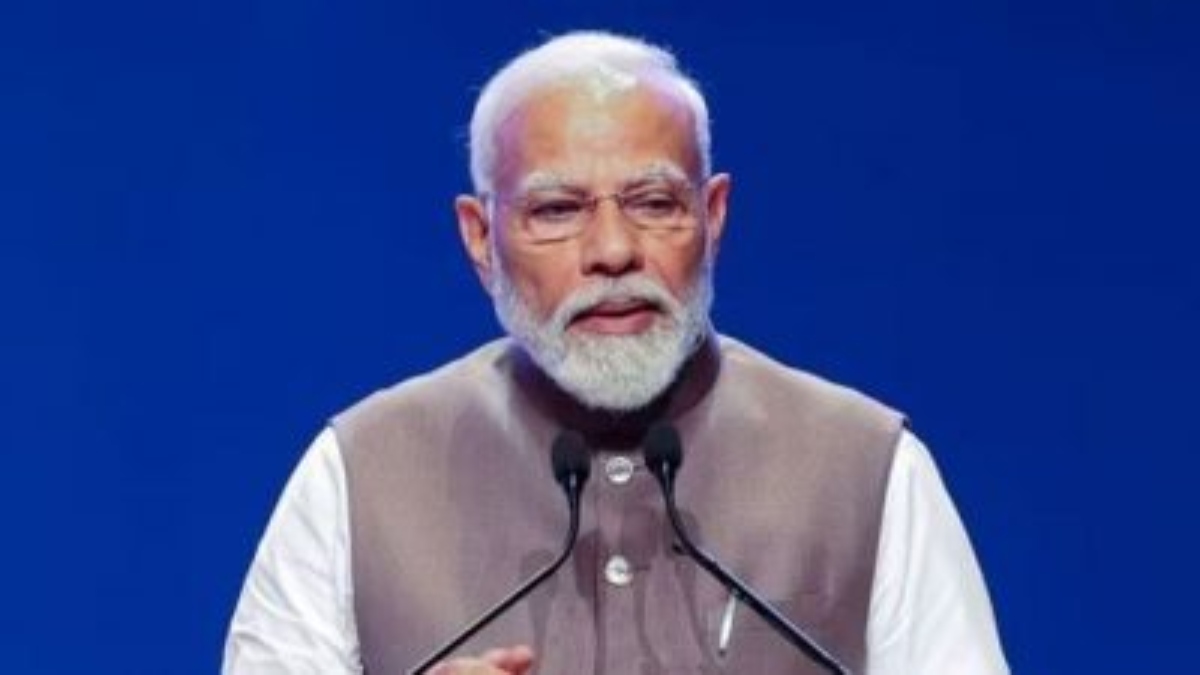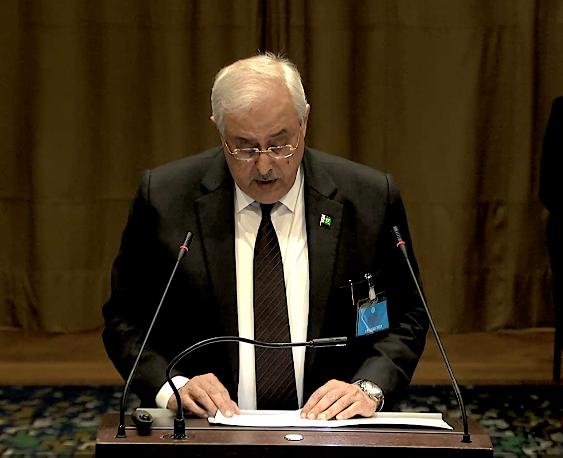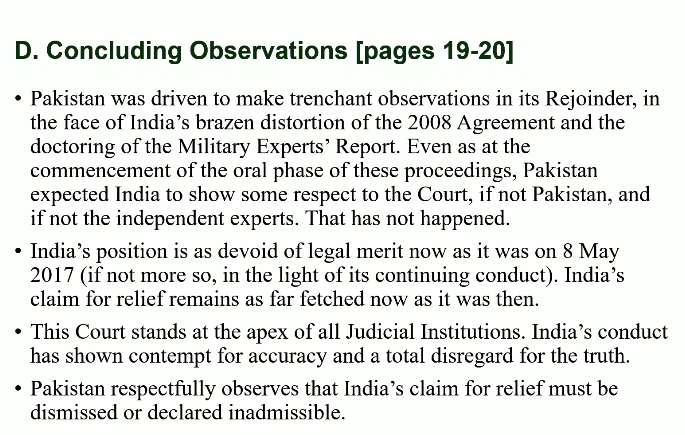Kulbhushan Jadhav case LATEST updates: The Pakistani agent said that consular access was denied to India as Jadhav was involved in espionage. He added that despite Jadhav being given option of judicial review, he refused it. “Should Jadhav choose to enter judicial review, he will have right to choose his lawyer to represent him,” he said. Submitting his concluding observations, Pakistan’s Khawar Qureshi said,“India’s claim for relief remains far-fetched.” On India’s stand that Kulbhushan Jadhav was kidnapped, Khawar Qureshi said, “Why is it necessary to engage in fiction?” He further claimed that the Indian side wasn’t providing clarity because “providing an explanation would expose the fiction.” Qureshi said that there are no inaccuracies in his pleadings on fact. “I challenge India to find any discrepancy in my pleadings on fact”, he said. Pakistan ad-hoc judge Tassaduq Hussain Jillani, who had suffered a cardiac attack ahead of the hearing, joined the sitting on last day of hearing. India delivered its final arguments in the Kulbhushan Jadhav case at the International Court of Justice (ICJ) on Wednesday evening, the third day of the hearing. Pakistan is expected to respond on Thursday from 9 pm. The ICJ has rejected five pleas made by Pakistan during the hearing of the Kulbhushan Jadhav case, including playing of so-called “confessional statement” of the Indian national and a request to adjourn the hearing citing illness of its ad-hoc judge. The four-day hearing in the Jadhav case started on 18 February at the ICJ headquarters in The Hague. Pakistan’s delegation on Tuesday led by Attorney General Anwar Mansoor Khan requested the international court to adjourn the hearing in the case to appoint a new ad-hoc judge as Justice Tassaduq Hussain Jillani suffered cardiac arrest before the hearing. However, the ICJ President Abdullahi Ahmed Yusuf while rejecting the plea asked Pakistan’s delegation to go ahead with proceeding if it is ready with its argument. Anwar Mansoor Khan then went on to make his argument, a day after the Indian side told the world court that Jadhav had been sentenced to death by a military court during an “opaque” hearing and that he should be released forthwith. In his representation, the Pakistani advocate said the Indian claim to relief must be dismissed. In addition, Pakistan also had sought cross-examination of Deputy High Commission of India JP Singh. JP Singh who accompanied the family of Jadhav in Pakistan to meet him in jail last year said that the condition of Jadhav did not look well. During the proceeding, Pakistan, making a long shot, also wanted the “accomplices” of Jadhav for witnesses during the hearing. However, the court also rejected that. The 48-year-old former naval officer, Kulbhushan Jadhav, was sentenced to death by a Pakistani military court on charges of espionage and terrorism on 11 April, 2017, following which India moved the ICJ, challenging the verdict. Subsequently, on 18 May, 2017, a 10-member bench of the ICJ restrained Pakistan from executing Jadhav till the adjudication of the case.
Kulbhushan Jadhav case updates: Pakistan says consular access was denied as Jadhav was involved in espionage; ICJ hearing concludes
Kulbhushan Jadhav case LIVE updates: The Pakistani agent said that consular access was denied to India as Jadhav was involved in espionage.
)
ICJ president Abdulqawi Ahmed Yusuf adjourns sitting
The ICJ is expected to deliver its verdict in the summer of 2019. Agents of the parties will be informed in due course as to date on which judgment will be pronounced.
‘Consular access was denied to India as Jadhav was involved in espionage’
The Pakistani agent said that despite Jadhav being given option of judicial review, he refused it. “Should Jadhav choose to enter judicial review, he will have right to choose his lawyer to represent him,” he said.
“It is the choice of the convict to seek review of reconsideration, which if he seeks, will be given to him. There is an FIR against Kulbhushan Jadhav in civilian court for terrorism, apart from the conviction under espionage.”
Pakistani agent accuses India of committing human rights violations by using pellet guns in Kashmir
Gujarat riots, Samjhauta Express blast, Kathua rape, use of pellet guns are being cited by Pakistan agent in his concluding remarks.
Pakistani cites Afsal Guru’s case
Pakistani agent said, “The Supreme Court of India upheld his (Afzal Guru’s) death sentence on the ground of satisfying “collective conscience of the society”. Is that a ground for hanging?” He also accused India of shielding perpetrators of Samjautha Express blast case.
Pakistan’s agent makes submission in ICJ
“Pakistan has a robust judicial review and reconsideration system,” Pakistan’s agent submitted in the ICJ.
Pakistan says India’s claim for relief must be dismissed or declared inadmissible
“India’s claim for relief remains far-fetched,’ Qureshi said, while presenting his concluding observations. “Pakistan expected India to show some respect to this court, if not Pakistan; India’s conduct shows total disregard for truth and contempt for accuracy”
Qureshi continues to take dig at India
“A sovereign state is accused of concealing facts, and I am being asked to maintain moderation,” says Qureshi.
Qureshi slams India for its conduct
“India’s conduct cannot go unchecked. This is the court of international community, not fantasy not fiction,” says Khawar Qureshi.
India ’engaging in fiction’ with kidnap story, says Qureshi
On India’s stand that Kulbhushan Jadhav was kidnapped, Khawar Qureshi said, “Why is it necessary to engage in fiction?” He further claimed that the Indian side wasn’t providing clarity because “providing an explanation would expose the fiction.”
Qureshi says India’s accusations devoid of evidentiary basis
“India persist to distract and deflect attention to answer critical questions… India’s accusations devoid of any evidentiary basis,” said Khawar Qureshi. “India believes it does not have duty to ensure accuracy in its pleadings or effect timely corrections and that there are no consequences for its blatant inaccuracies”
No inaccuracies in my pleadings, says Qureshi
On military law experts’ report, Khawar Qureshi said that there are no inaccuracies in his pleadings on fact. “I challenge India to find any discrepancy in my pleadings on fact”, Qureshi said. He alleged doctoring by India in pleadings.
‘Pakistan will adopt real approach to language’
“India is seeking to distance itself from the position stated by this court itself,” says Khawar Qureshi.
He hit outs at India’s Harish Salve for accusing him of using “abusive language” in court. “Characters from wonderland have no place in this court… Pakistan will adopt a real approach to language,” he said.
‘India engaging in double standards’
“The double standards India has engaged in is evident from its submissions itself,” says Khawar Qureshi.
Khawar Qureshi begins presentation
Representing Pakistan, advocate Khawar Qureshi hit back at India’s Harish Salve and said that India did not respond substantively but engaged in rhetoric. “India has made no arguments substantive or otherwise,” he said.
Pakistan ad-hoc judge joins sitting on last day of hearing
Pakistan had earlier asked the International Court of Justice (ICJ) to adjourn the case, citing the illness of its ad-hoc judge Tassaduq Hussain Jillani who suffered a cardiac attack ahead of the hearing. The International Court of Justice had on Wednesday said that it has not received any evidence that the ad-hoc judge for Pakistan is unable or unwilling to continue to exercise his duties in the Kulbhushan Jadhav case.
Judges arrive in ICJ courtroom
Pakistan will begin its presentation shortly.
RECAP | Annul the decision of the military court and release Jadhav, India tells ICJ
India on Wednesday questioned the functioning of Pakistan’s notorious military courts and urged the International Court of Justice (ICJ) to annul Kulbhushan Jadhav’s death sentence, which is based on an “extracted confession”.
“Annul the decision of the military court and restrain Pakistan from giving effect to the (death) sentence. Release Jadhav and ensure his safe passage to India. If not then direct a trial under normal law before civilian courts with full consular access,” Deepak Mittal, Joint Secretary, the Ministry of External Affairs, told the ICJ judges.
Making the final submission in the ICJ on the third day of the hearing, Mittal requested the top UN court to declare that Pakistan acted in breach of Article 36 of Vienna Convention, failed to inform Jadhav of his rights and declined consular access to him.
RECAP | Pakistan urged ICJ to dismiss India’s plea
Pakistan on Tuesday urged the ICJ to dismiss India’s plea in the Kulbhushan Jadhav case, as it accused New Delhi of using the top UN court for “political theatre”.
Making submissions on Pakistan’s behalf, counsel Khawar Qureshi said, “India’s application should be declared inadmissible by reason of India’s conduct in this context manifesting abuse of rights, lack of good faith, illegality, lack of clean hands and misrepresentation.”
Last day of hearing in ICJ
The four-day hearing in the Kulbhushan Jadhav case opened on Monday amid heightened tensions between India and Pakistan following one of the worst terror attacks in Jammu and Kashmir by Pakistan-based Jaish-e-Mohammad terror group that killed 40 CRPF soldiers.
The ICJ is expected to deliver its verdict in the summer of 2019.
RECAP | India urged ICJ to annul Jadhav’s death sentence during first round of arguments
India on Monday urged the International Court of Justice (ICJ) to annul Kulbhushan Jadhav’s death sentence by a Pakistani military court and order his immediate release, saying the verdict based on a “farcical case” hopelessly fails to satisfy even the minimum standards of due process.
“Military courts of Pakistan cannot command the confidence of this court and should not be sanctify by a direction to them to review and re-consider the case. India seeks annulment of Jadhav’s conviction, and directions that he be released forthwith,” said Harish Salve, the lawyer representing India and Jadhav in the case at the ICJ.
Pakistan to make final submissions before ICJ at 9 pm
Pakistan will respond to India’s arguments in the ICJ on Thursday in its final submission in the Kulbhushan Jadhav case. It will be given 90 minutes to make its presentation.
)
)

